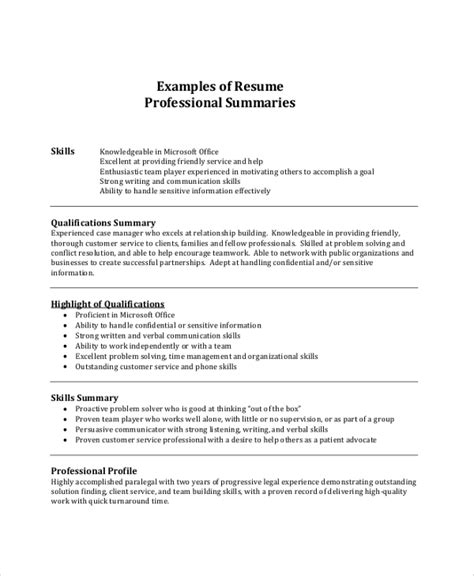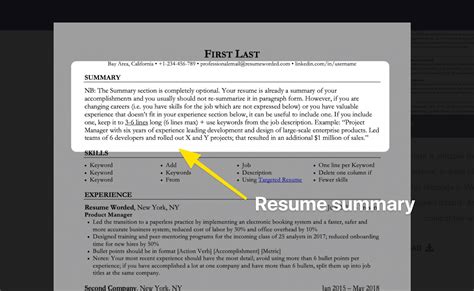Summary On A Resume

Crafting a compelling resume summary is an essential step in securing job interviews and leaving a lasting impression on recruiters. This concise section, typically positioned at the top of your resume, provides a snapshot of your professional profile and highlights the value you bring to potential employers. In this article, we will delve into the art of writing an impactful resume summary, exploring the key elements, best practices, and real-world examples to help you stand out in a competitive job market.
Understanding the Purpose of a Resume Summary

A resume summary, also known as a professional summary or career summary, serves as a brief yet powerful introduction to your work experience, skills, and achievements. It is designed to capture the attention of hiring managers and showcase your unique qualifications for the desired role. By highlighting your most relevant strengths and accomplishments, you can create a compelling narrative that aligns with the job requirements and sets you apart from other candidates.
Key Elements of an Effective Resume Summary

When crafting your resume summary, it is crucial to include specific elements that showcase your expertise and make a strong impression. Here are the key components to consider:
Professional Title
Begin your summary with a clear and concise professional title that accurately reflects your current or target position. For example, “Experienced Marketing Manager” or “Software Engineering Specialist”. This helps recruiters quickly identify your role and expertise.
Years of Experience
Provide a general timeframe for your professional experience. For instance, you might mention, “10+ years of experience in customer service” or “Recent graduate with a passion for data analysis”. This gives recruiters an idea of your career stage and level of expertise.
Core Skills
Highlight your top skills that are relevant to the job you’re applying for. For example, “Strong project management skills with expertise in Agile methodologies” or “Proficient in Python and machine learning algorithms”. Ensure these skills are aligned with the job description to demonstrate a good fit.
Key Achievements
Include one or two notable achievements that showcase your impact and value. Quantifiable achievements are particularly impressive. For instance, “Increased client retention by 20% through strategic account management initiatives” or “Developed a machine learning model that improved prediction accuracy by 15%”. These achievements demonstrate your ability to deliver results.
Industry Expertise
If you have specialized industry knowledge or experience, mention it in your summary. For example, “Skilled healthcare professional with extensive experience in patient care and hospital administration” or “Seasoned financial analyst with expertise in regulatory compliance”. This highlights your industry-specific skills and knowledge.
| Skill | Quantifiable Achievement |
|---|---|
| Leadership | Led a team of 10 developers, achieving a 30% increase in project efficiency. |
| Data Analysis | Analyzed customer feedback data, resulting in a 15% improvement in product satisfaction. |
| Marketing Strategy | Implemented a social media campaign that boosted brand awareness by 25%. |

Best Practices for Writing a Compelling Resume Summary
To make your resume summary truly stand out, consider these best practices:
Use Action Verbs
Start your summary sentences with strong action verbs to demonstrate your capabilities and accomplishments. Examples include managed, led, developed, optimized, and improved.
Keep it Concise
A resume summary should be brief and to the point. Aim for a length of 3 to 4 sentences or around 30 to 50 words. Focus on delivering a clear and impactful message.
Quantify Your Achievements
Whenever possible, quantify your achievements to provide concrete evidence of your success. Numbers and percentages make your accomplishments more tangible and impressive.
Tailor to the Job
Review the job description carefully and align your summary with the desired qualifications and skills. Highlight the aspects of your profile that match the employer’s needs.
Avoid Clichés and Overused Phrases
Steer clear of generic statements and clichés like “results-driven professional” or “team player.” Instead, use specific language that showcases your unique strengths.
Proofread and Edit
Carefully proofread your resume summary for grammar and spelling errors. A well-written summary demonstrates attention to detail and professionalism.
Real-World Examples of Effective Resume Summaries
Let’s explore some real-world examples of resume summaries to inspire and guide your own writing:
Example 1: Software Engineer
“Senior Software Engineer with 8 years of experience in developing robust web applications. Expert in JavaScript, React, and Node.js. Proven track record of delivering high-quality code and leading cross-functional teams. Skilled in Agile methodologies, with a passion for continuous learning and innovation.”
Example 2: Marketing Specialist
“Enthusiastic Marketing Specialist with 5 years of experience in B2B marketing. Proficient in developing integrated marketing campaigns, with a focus on lead generation and brand awareness. Skilled in SEO, social media marketing, and content creation. Achieved a 25% increase in website traffic through strategic content planning.”
Example 3: Data Analyst
“Data-driven Analyst with 3 years of experience in business intelligence. Skilled in analyzing complex datasets and providing actionable insights. Proficient in SQL, Python, and Tableau. Developed predictive models that improved forecast accuracy by 18%. Passionate about leveraging data to drive business growth.”
Conclusion: Elevate Your Resume with a Powerful Summary

A well-crafted resume summary is a powerful tool to showcase your professional value and make a positive impression on recruiters. By incorporating the key elements, following best practices, and tailoring your summary to each job application, you can significantly increase your chances of landing interviews and securing your dream job.
FAQ
How long should my resume summary be?
+
A resume summary should be concise, typically ranging from 3 to 4 sentences or around 30 to 50 words. It should provide a snapshot of your professional profile and highlight your key strengths and achievements.
Can I include multiple roles in my resume summary?
+
While it’s possible to mention multiple roles in your summary, it’s best to focus on your most recent and relevant position. Highlighting your current or most significant role allows you to showcase your expertise and accomplishments effectively.
Should I include my education in the resume summary?
+
Education is an important aspect of your professional profile, but it’s typically included in a separate section on your resume. The resume summary is reserved for highlighting your work experience and skills. However, if your education is highly relevant to the job, you can briefly mention it.



